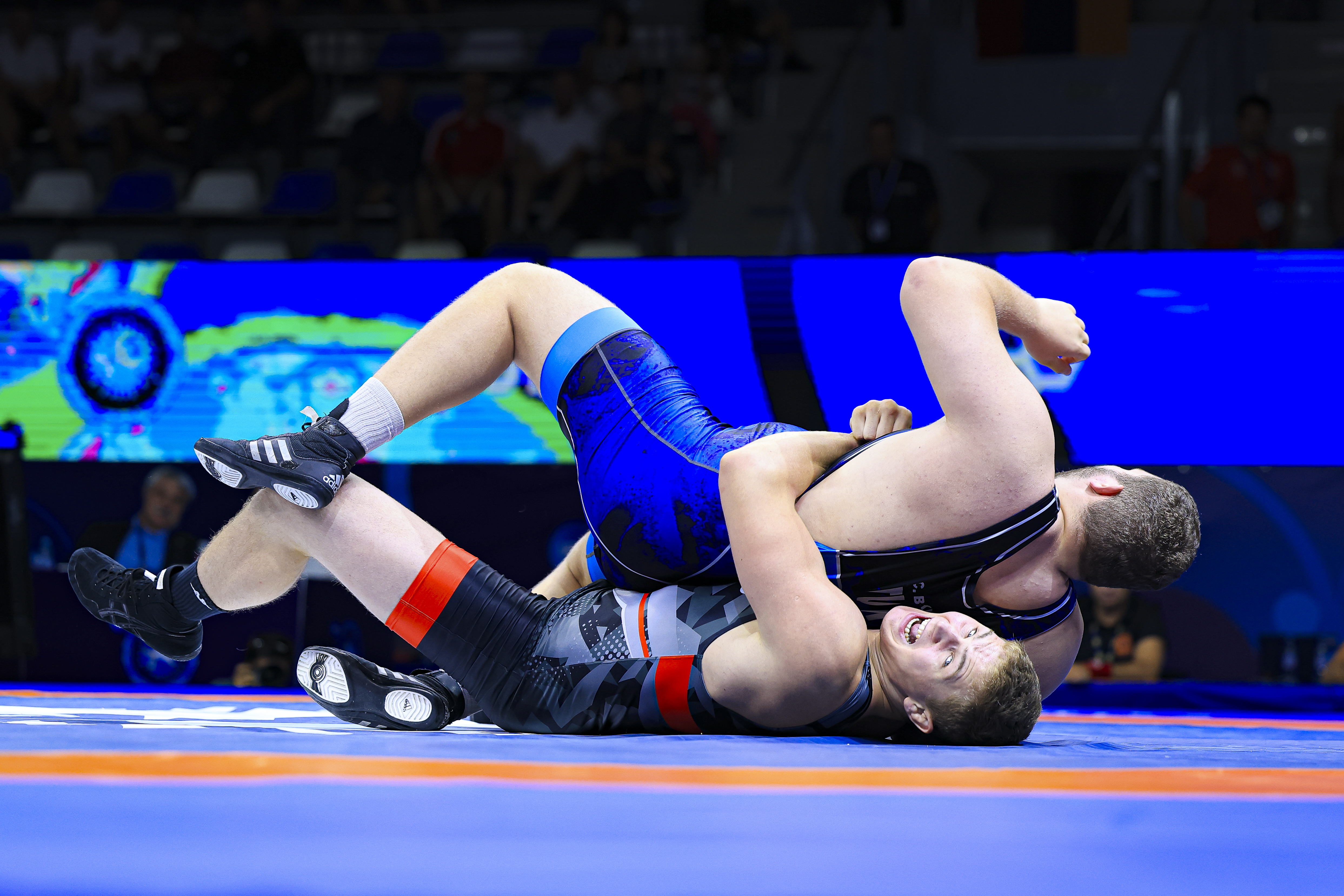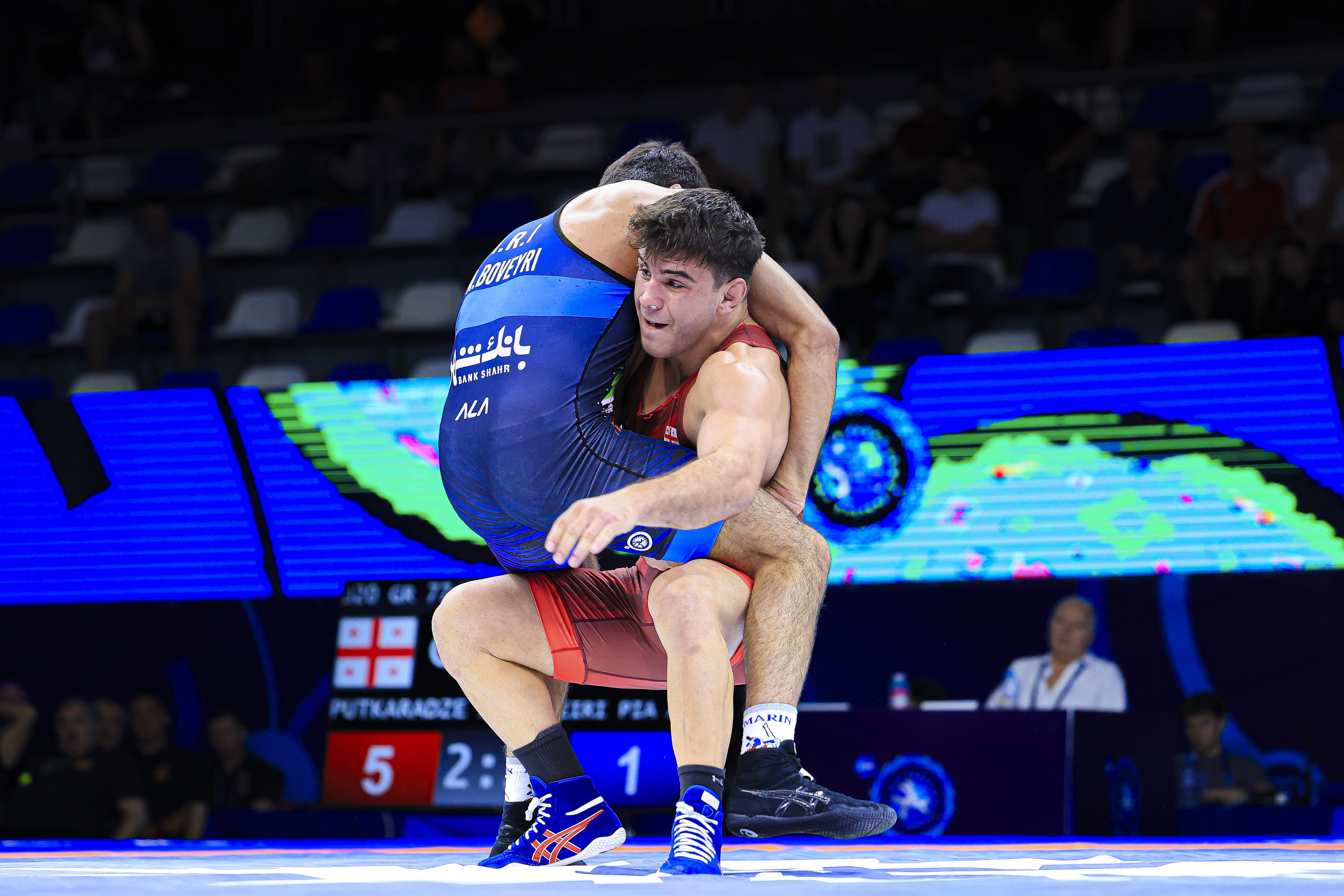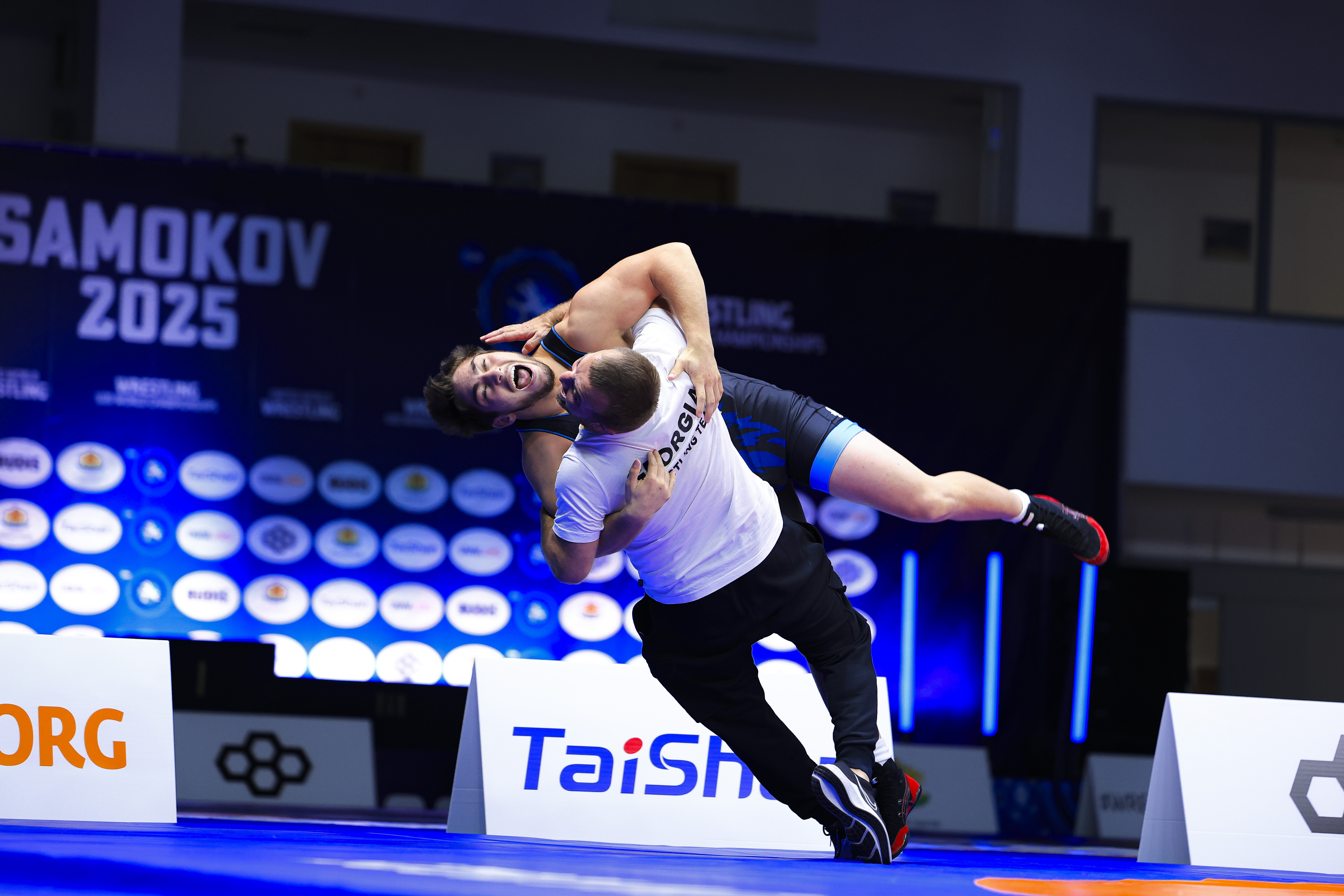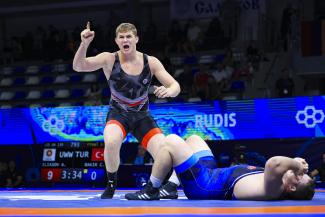SAMOKOV, Bulgaria (August 24) -- Ali ILIASOV (UWW) made his international wrestling debut at the European U20 Championships in July and won a silver medal. Two months later, the 18-year-old is a world champion.
Wrestling at his career first World U20 Championships on Sunday, Iliasov emerged at the champion in the 130kg weight with victories over rivals more experienced and heavier, literally, than him.
Weighing only 115kg for the 130kg final, Iliasov defeated returning silver medalist Abolfazl FATHITAZANGI (IRI) in the semifinals and on Sunday, he managed to humble two-time world U17 champion Yusuf BAKIR (TUR) in the final and win the gold medal.
"I’m underweight for the class but I feel a kind of relief," Iliasov said. "I’ve fulfilled a small dream of mine. I still haven’t fully realized that I’ve become a world champion."
Overall, Iran became the team champions with 117 points. Armenia managed second-place finish with 98 points and Azerbaijan was third with 90 points. This was Iran's fourth straight team win in Greco at the World U20 Championships.
 Ali ILIASOV (UWW) turns Yusuf BAKIR (TUR) for two points during the 130kg final at the World U20 Championships. (Photo: United World Wrestling / Kadir Caliskan)
Ali ILIASOV (UWW) turns Yusuf BAKIR (TUR) for two points during the 130kg final at the World U20 Championships. (Photo: United World Wrestling / Kadir Caliskan)
Iliasov was only 10 seconds into the final against Bakir when he used an arm-drag and had Bakir in trouble. Bakir managed to stop the takedown but he stepped out and was cautioned for fleeing as well. Iliasov led 2-0 after this sequence.
A similar arm drag brought down Bakir to the mat and Iliasov scored his first takedown. A stepout made the score 5-0. Iliasov remained relesntless in his attacks and a snapdown helped him score another takedown on Bakir. He then turned Bakir for the match-winning gut-wrench.
"I managed to beat my opponent so decisively was because I was extremely confident in myself, even more confident than he was," he said.
While he blanked Bakir in the final, Iliasov did have his share of close bout in Samokov. In his opening bout, Iliasov had a close 7-6 victory over Viachaslau FEDARYNA (UWW). He scored a technical superiority win over Leonhard JUNGER (AUT) in the second match before facing Fathitanzangi in the semifinals.
"I would say I was warming up, a little nervous [in the first bout]," he said. "After that first match I completely opened up."
In the semifinals, Iliasov led 3-0 when Fathitanzangi went for a pushout. Iliasov tried to stop it by throwing Fathitanzangi but he landed on his back and the Iranian wrestler was given two points.
As Fathitanzangi was awarded par terre position in the second period, he also got the 3-3 criteria lead over Iliasov. The Iranian tried defending his lead for the win but Iliasov managed to circle around and bring him down for two points. Fathitanzangi pulled one back with a stepout but that was all as Iliasov entered the gold-medal bout with a 5-4 win.
"My performance can be rated 9 out of 10," he said. "Because in the semifinal I strayed a bit from my tactics, lost focus, and almost gave away points."
With experience from this World U20 Championships, Iliasov now wants to switch to senior level as early as next year.
"I’ll try at the senior level," he said. "Of course, that’s another level, wrestler with much more experience. But I’ll do my best to test myself."
Georgia double
Georgia earned two gold medals on the final day of the World U20 Championships, a feat the country has not achieved since 2016.
Anri PUTKARADZE (GEO) and Luka KOCHALIDZE (GEO) came out with dominant performances in the 77kg and 87kg finals respectively to bring home two golds for Georgia.
 Anri PUTKARADZE (GEO) hits a counter attack against Ahoura BOUVEIRI (IRI) during the 77kg final. (Photo: United World Wrestling / Kadir Caliskan)
Anri PUTKARADZE (GEO) hits a counter attack against Ahoura BOUVEIRI (IRI) during the 77kg final. (Photo: United World Wrestling / Kadir Caliskan)
At 77kg, Putkaradze was up against Ahoura BOUVEIRI (IRI) in the final and got the par terre position. He managed to turn Bouveiri two times for a 5-0 lead. In the second period Bouveiri had the chance to turn it around when he the top position in par terre.
Things, however, did not go that way. As Bouveiri was trying lift Putkaradze, the Georgian countered with a bodylock and then slammed him for two-point takedown. He then turned the Iranian for two more points and won the gold medal, 9-1. Iran challenged for a foul but there was none and one more point was added to his score to make it 10-1.
 Luka KOCHALIDZE (GEO) celebrates with his coach after winning the 87kg final. (Photo: United World Wrestling / Amirreza Aliasgari)
Luka KOCHALIDZE (GEO) celebrates with his coach after winning the 87kg final. (Photo: United World Wrestling / Amirreza Aliasgari)
The second gold came from Kochalidze as he pinned Abdurakhman ABDULKADYROV (UWW) in the 87kg final. In a rematch of the European U20 Championships final at 87kg, Abdulkadyrov was hoping to avenge his loss from Carole, Italy.
He was given the par terre advantage in the first period and he tried turning Kochalidze, who blocked the turn but lost his grip as well and the turns were called neutral. As Abdulkadyrov was back on top, he again tried to turn Kochalidze who managed stop Abdulkadyrov and kept him on the mat till the fall was called.
Georgia was the only country to win two gold medals in this competition in Greco-Roman.
At 63kg, senior Asian champion Aytjan KHALMAKHANOV (UZB) proved why he will be medal threat in Zagreb with a dominant run to gold-medal. He defeated Aleks MARGARYAN (ARM), 12-2, with two big four-point throws.
Khalmakhanov began with a underhook throw for a takedown in the first 20 seconds. He tried the same move again but Margaryan blocked and scored a takedown for a 2-2 criteria lead. Late in the first period, Khalmakhanov was awarded the par terre position for one point but he failed to score and led 3-2 at the break.
If Margaryan hoped for a better second period, Khalmakhanov had no such idea. He slammed Margaryan from standing using the underhook for four points. He continued the sequence and lifted Margaryan and slammed him forward for four more points.
The two big throws for Khalmakhanov were enough for him for the win despite a challenge from Armenia. The lost challenged made his score 12-2.
RESULTS
63kg
GOLD: Aytjan KHALMAKHANOV (UZB) df. Aleks MARGARYAN (ARM), 12-2
BRONZE: Mohammad ABOUTALEBI (IRI) df. Kristiyan MILENKOV (BUL), 9-0
BRONZE: Igor PUNCHENKO (UWW) df. Damir IBRASHOV (KAZ), 5-1
77kg
GOLD: Anri PUTKARADZE (GEO) df. Ahoura BOUVEIRI (IRI), 10-1
BRONZE: Zaur BESLEKOEV (UWW) df. Raatbek PAIAZBEKOV (KGZ), 8-0
BRONZE: Kiryl VALEUSKI (UWW) df. Leister BOWLING (USA), 9-0
87kg
GOLD: Luka KOCHALIDZE (GEO) df. Abdurakhman ABDULKADYROV (UWW), via fall
BRONZE: Erik TER MATEVOSYAN ( ARM) df. Elias LYYSKI (FIN), 1-1
BRONZE: Temirlan TURDAKYN (KAZ) df. Orkhan HAJIYEV (AZE), 4-4
130kg
GOLD: Ali ILIASOV (UWW) df. Yusuf BAKIR (TUR), 9-0
BRONZE: Ivan YANKOVSKYI (UKR) df. Mazaim MARDANOV (AZE), 8-0
BRONZE: Abolfazl FATHITAZANGI (IRI) df. Viachaslau FEDARYNA (UWW), 5-1




 Ali ILIASOV (UWW) turns Yusuf BAKIR (TUR) for two points during the 130kg final at the World U20 Championships. (Photo: United World Wrestling / Kadir Caliskan)
Ali ILIASOV (UWW) turns Yusuf BAKIR (TUR) for two points during the 130kg final at the World U20 Championships. (Photo: United World Wrestling / Kadir Caliskan) Anri PUTKARADZE (GEO) hits a counter attack against Ahoura BOUVEIRI (IRI) during the 77kg final. (Photo: United World Wrestling / Kadir Caliskan)
Anri PUTKARADZE (GEO) hits a counter attack against Ahoura BOUVEIRI (IRI) during the 77kg final. (Photo: United World Wrestling / Kadir Caliskan) Luka KOCHALIDZE (GEO) celebrates with his coach after winning the 87kg final. (Photo: United World Wrestling / Amirreza Aliasgari)
Luka KOCHALIDZE (GEO) celebrates with his coach after winning the 87kg final. (Photo: United World Wrestling / Amirreza Aliasgari)
Share your thoughts.
Comments